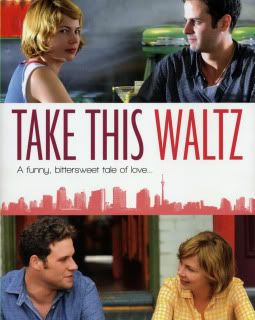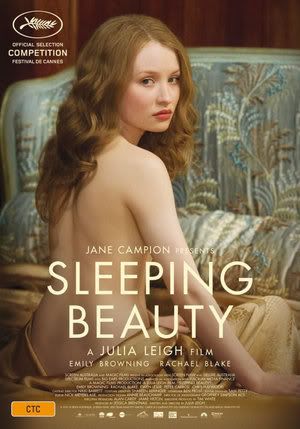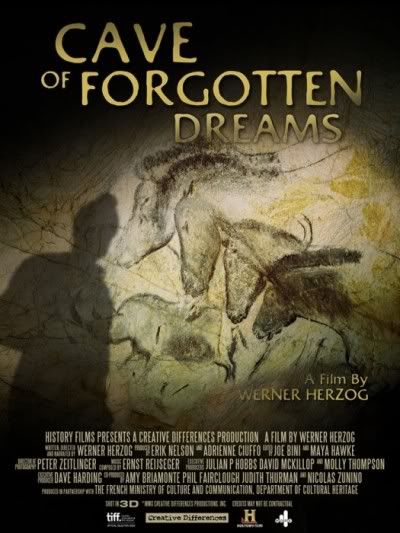The 31st Atlantic Film Festival

While I waited for Take this Waltz to begin, I was forced to listen to three quarters of the two old couples seated behind me try to convince the fourth that Sarah Polley, the film's writer and director, is, indeed, famous in some small way. They really couldn't come up with any examples; they knew that she'd done Away from Her, but they were totally blanking on her acting career, aside from mentioning that she was in that film "about the bus crash." I wanted to shout at them: "she's the kid from Road to Avonlea, for Christ's sake!" She is, essentially, the most Canadian actor in Canada. And that's something.
And, indeed, the fact that Sarah was the face of Road to Avonlea from 1990-1996--when I was ages 9 to 15--left me with a great deal of resentment toward her, which, thankfully, I've been able to brush off. For those unfamiliar with the show, it existed in the same fictional universe as Anne of Green Gables ("fictional" because it features the same characters, not because PEI is imaginary). It won four Emmys, which is impressive, since I didn't know that Canadian television qualified for that award. In any event, what seemed like the show's ubiquitous presence led me, at a young age, to the incorrect impression that Canadian entertainment was focused almost entirely on rural, conflict-free period pieces. How awful. If only I'd known David Cronenberg then...
Anyway, Take This Waltz stars the lovely and talented Michelle Williams, and the lovely and talented Sarah Silverman, and, uh, Seth Rogen. The story is nothing especially new: it focuses on Margot (Michelle Williams), a naive and spritely girl, who is married to Lou (Seth Rogen), a seemingly well-meaning fellow, who is writing a cookbook entirely on chicken. At the beginning of the film, Margot meets Daniel (Luke Kirby), to whom she has an immediately and profound attraction. This is problematic, since she loves her husband and wants to stay loyal to him, but finds herself drawn to Daniel, who lives directly across the street. And also there's Geraldine (Sarah Silverman), Lou's sister, who happens to be an alcoholic. Domestic drama ensues.
Sure, it's not an original story. So what? People are constantly cheating, or tempted to cheat, or unhappy with their life, or happy with it, but wondering if they can be happier. This shit happens. And Take This Waltz is, for lack of a better word, Canadian, and therefore worth watching.
What does it mean, for a film to be "Canadian"? It's hard to pin down. Just being made in Canada, or by Canadians, doesn't cut it. Most of David Cronenberg's films, up to and including eXistenZ, are very Canadian. The ones afterwards are not so Canadian. Most of Bruce McDonald's films qualify, but especially Highway 61 and Roadkill. Early Atom Egoyan. Norman Jewison is Canadian, but his films are not. Denis Villeneuve's films look too good to be Canadian, but one of them, Maelstrom, is narrated by a fish, and that's unbelievably Canadian. Anything featuring Don McKellar or Sook-Yin Li is Canadian, even if it isn't. Ryan Gosling is going to have to reaffirm his Canadianness soon, or I'll gladly strip him of it. Etc. I can clarify in the comments, if necessary. This list is objective.
Take This Waltz is Canadian because it assaults you with honesty. It doesn't let off anyone easy; the three main characters are all complicit in the infidelity (or the possibility of it). It doesn't make it easy on the audience, either; you can see why Margot is in a conundrum. And also, because it's so goddamn Canadian, everyone is really nice and polite while it's happening, and not in some unbelievable way, either. It also does a good job of effectively mixing dramatic and comedic modes, which can sometimes be tricky: "dramedy" is not a term that excites this particular film-goer.
A lot of the film's honesty comes from Williams. I don't know how to explain it, but Michelle Williams has the most honest face in show business. Her face is a raw nerve. That might not make sense, but that's the best way I can put it.
Based on reading the few message boards I lurk at, and speaking to a couple of people in person, I'm lead to believe that people have really soured on Seth Rogen. He gets a free pass with me. Why? Because the dude has remained unabashedly Canadian. He played a Canadian in Knocked Up and Undeclared, even though the fact of his characters' origins were totally irrelevant to those shows' plots. And here he's undoubtedly taking a pay cut to be in a Sarah Polley movie. That's unheard of. I mean, when I think of other successful Canadian comedic actors, I think of Jim Carrey, for instance, who currently seems about as Canadian as Bill Clinton.
Watching the film, I couldn't help but think about how some films, when focusing on human relationships, want you to take what happens in the two hour running time (or even an individual scene) and accept it as an encapsulation of the whole relationship; in other words, if you're shown some scenes of two people in a bad relationship, you should take it as a given that the relationship, as whole, is like this. But some directors, or artists, don't want it that way: what they're offering you is a snapshot, one that might not be representative of the whole. And it's hard to tell, sometimes, which example you're watching. Margot and Lou's relationship seems very immature--they narrate fantastic ways of murdering each other as a show of endearment--and largely sexless. But is that true of the relationship as a whole, or only the moments offered? The film leaves it up to you, and if you interpret it one way or the other, your sympathies could change.
Anyway, support Canadian films and watch this fucking movie.











